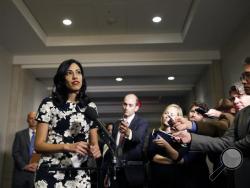WASHINGTON (AP) — The discovery of another cache of emails potentially important to the FBI's investigation of Hillary Clinton's email practices raises an immediate question: How could close Clinton adviser Huma Abedin have been unaware of their existence?
The emails were found on a computer seized during an unrelated investigation involving Abedin's estranged husband, disgraced former New York congressman Anthony Weiner. He is being investigated in connection with online communications with a teenage girl.
It's possible that Abedin did not know about the emails on Weiner's computer, forgot about them or for some other reason did not turn them over.
In a sworn deposition taken in June as part of a lawsuit filed by the conservative legal group Judicial Watch, Abedin was asked about what devices she had used to send or receive messages from her account on the clintonemail.com server. As part of the process in 2015 of returning her work-related emails to the State Department, Abedin said she "looked for all the devices that may have any of my State Department" work and provided two laptops and a Blackberry to her lawyers for review.
Abedin made no mention of there being additional devices where her emails might have been saved.
If the FBI finds emails Abedin sent or received through the clintonemail.com server archived on the device recently recovered from her home, that would appear to conflict with what she told the FBI earlier this year.
In an April interview, Abedin told FBI agents that after she left the State Department in 2013, Clinton's staff transitioned to a different email server and she "lost most of her old emails as a result." She said she had only accessed her clintonemail.com account through a web portal and that she "did not have a method for archiving her old emails prior to the transition."
A person familiar with the investigation said the device that appears to be at the center of the new review belonged only to Weiner and was not a computer he shared with Abedin. As a result, it was not a device Abedin searched for work-related emails at the time of the initial investigation, according to the person, who said of Abedin that it was "news to her" that her emails would be on a computer belonging to her husband.
The FBI has discovered a trove of thousands of emails and has obtained a warrant to search the messages related to the Clinton investigation. It's not clear how many emails might be considered relevant to the probe or what significance, if any, they might have.
It's also not clear how long the additional email review will take or whether the process will be done by Election Day.
The official who spoke to the AP was not authorized to discuss an ongoing investigation by name and spoke on condition of anonymity.
FBI Director James Comey revealed the existence of the emails in a remarkable and ambiguous letter to Congress on Friday. The notification, two weeks before the election, came over the objections of Justice Department officials and drew scathing criticism from former prosecutors and Democrats in Congress.
White House spokesman Josh Earnest said he would not defend or criticize Comey's decision, but noted that Comey was in a "tough spot." Comey has said he felt compelled to alert Congress after having already told lawmakers that the investigation was concluded.
Even if the recovered emails are found to contain classified information, it's not clear what impact that would have on the investigation. Comey has already described Clinton and her aides as "extremely careless" and has said agents found scores of classified emails on Clinton's server.
But he also said there was no evidence they intended to mishandle classified information or obstructed justice, elements he suggested would be necessary for a prosecution.
The Justice Department, moving to address concerns over the timing of the revelation of the emails and a potential post-election spillover, said Monday it would "dedicate all necessary resources" to promptly concluding the review of the new emails.
___
Follow Eric Tucker on Twitter://www.twitter.com/etuckerAP

